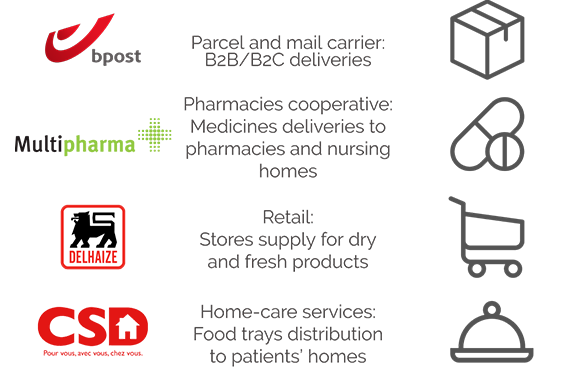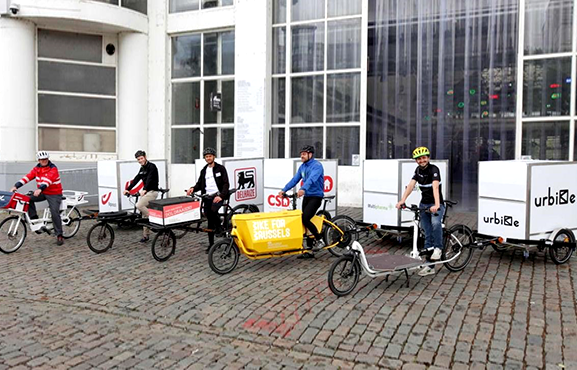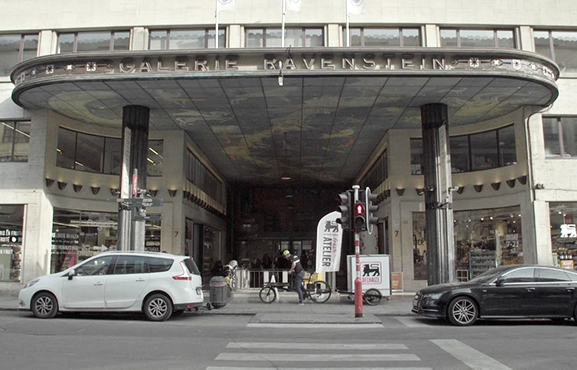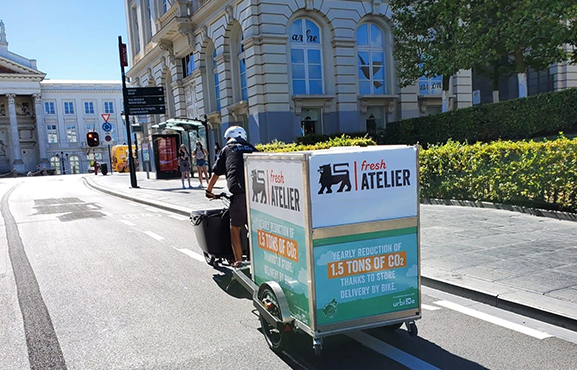
Faster and cleaner: Project tests cargo bike logistics in Brussels
In this third and final #CargoBike series article, ECF interviews urbike & Delhaize about the BCklet project, a cargo bike project that aims to rethink traditional delivery models in Brussels.
Brussels is not exactly known for smooth flowing road traffic. In 2019, TomTom ranked the city as the 7th most congested large city in Europe. According to GRACQ, the number of vans in the capital skyrocketed over the last two decades, representing 84% of all motorized commercial vehicles.
In this context, an innovative city logistics model began to take shape in Brussels: the BCklet project. Since then, the project has successfully demonstrated just how efficient, environmentally friendly and convenient cargo bikes are for urban deliveries.
The model is based on the containerisation of cargo boxes, which significantly reduces the handling costs and simplifies the products’ transhipment process thanks to efficient sorting and loading at terminals.
Three pillars can be identified:
- The container carrying up to 200kg & 1,5m³.
- The trailer manipulating the containers & pallets for an easy coupling with e-bikes.
- The couriers organized as a cooperative to promote local & high-quality jobs.
For two years, the project initiator, urbike, partnered with four major companies from different business sectors to establish the proof-of-concept of their distribution model.

The project was very well received among the staff of the four partner companies. The employees of two partners were directly involved in the operations and received cargo bike training sessions, “one partner even received applications from employees that had never ridden a bike” shares Renaud Sarrazin, co-founder of urbike.
urbike adopted a pluralistic and flexible approach during the pilot project. A tailor-made solution was developed for each partner according to their respective flow of products.
BCklet’s approach:
- Containers: Containers were developed to meet the partners’ needs. An ergonomist was involved to design ‘microhubs’ containers for parcel and mail couriers.
- Couriers: Some partners received cargo bike specific training for their couriers
- Logistics: Some partners loaded their containers at their own hubs before forwarding them to urbike’s handover points, while others externalized the sorting and filling to urbike.
- Products: Pharmaceutical products were transported using special isothermal solutions to maintain a strict temperature range of 15-25 degrees during summer.

The pilot project ended in December 2020 and its success can already be quantified:
- 5 jobs created
- 7 pilot projects implemented
- 20,000 deliveries carried out
- 200 tons of merchandises transported
- 12 tons of CO2 emissions saved.
Not bad for a human-powered vehicle, right? Since September 2020, urbike increased its deliveries by 480%, carrying out about 40,000 deliveries in six months, and cycling 84,000km, or twice around the world.
Luc D'Hondt, Sustainable Transport and Mobility Manager at Delhaize, stated that there were three main reasons for them to partner in the BCklet project:
- Environmental: Reduce the fleets’ footprint and move towards carbon neutrality
- Social: Partner with a project that promotes high-quality jobs
- Learning: Gain relevant experience in micro-logistics.
Volumes and accessibility were the main criteria for Delhaize when selecting shops to supply by bike. From June 2019 to December 2020, they supplied their Fresh Ateliers shops in Brussels by cargo bikes. Fresh Ateliers are small shops supplied six times/week with small delivery volumes, and often difficult to access by truck or van, making them the perfect candidates for micro-logistics!

Switching from macro to micro-logistics is not without its challenges. Delhaize is very experienced in delivering large volumes with trucks and containers, but “micro-logistics is an entirely different approach, we had to operate a mindset shift in the way to carry out our operations” stated D'Hondt. After some initial misfires, operations improved with the help of a micro-hub, which was set up with urbike in Ixelles, Brussels. “Working with a micro-hub is a totally new line of work” added D'Hondt. Now it is the first mile that has become more challenging than the last-mile.
Once at the micro-hub, the pallets and containers could be loaded on urbike’s trailers in less than one minute, easing the transhipment process and bringing efficiency to the delivery model. Delhaize is convinced by this chain thinking, which connects the traditional logistics world with cycle logistics.

Delhaize foresees that urban logistics will evolve into new hybrid models, split between cargo bikes, e-tuk-tuks and e-vans. Their participation in the BCklet project was an investment in the future and represented a unique opportunity to experiment and prepare for new ways of running their operations in urban environments.
The definition of new innovative delivery models requires time and work. “A great way for companies to progress towards cost-effective and viable distribution models is to join forces and bring together their volumes to reach economies of scale” underlines D'Hondt. Public authorities therefore have a paramount role to play in this transition, by supporting and fostering the development of shared micro-hubs, where different stakeholders can work together towards more liveable and sustainable cities.
Read the second article of this #CargoBike series here.
Join us in Velo-city 2021 Lisboa and attend our sessions on cargo bikes: “Exploring the Endless Potential of Cargo Bikes” – September 7, 11:00-12:00 “E-commerce Boom: Cargo Bikes to the Rescue!” – September 9, 10:15-11:15
Network/Project Involved:
Contact the author
Recent news!
Upcoming events
Contact Us
Avenue des Arts, 7-8
Postal address: Rue de la Charité, 22
1210 Brussels, Belgium









